Question: Maybe it’s just a language thing that needs a bit more description or explanation for me of the words, but I was wondering what the difference is between the words “soul” and “spirit”? And are spirits also in a sense different than ghosts? And now I’m thinking further, and spirits like in angels? And angels vs. demigods? And are there fallen angels? And if so, are there then also fallen demigods (if they are the same?) And will that be like the same as in demons? Got a bit on a roll here, haha.
Answer:
All of these words – souls, spirits, ghosts, angels, demigods and demons – have different meanings for different people. The Sanskrit words for most spiritual ideas are very specific, but to convey their meaning to people like us who are not Sanskrit scholars, our spiritual masters have used English words which sometimes have more than one meaning. And as many of us are coming from a more or less Christian background, we may find these different meanings a bit confusing. So, I will try to explain them from a Vedic point of view.
Soul
The word “soul” in the Vedic teachings refers to the atma or eternally living spiritual being who dwells within all living things and is the animating principle – the source of life that gives consciousness to an otherwise dead material body.
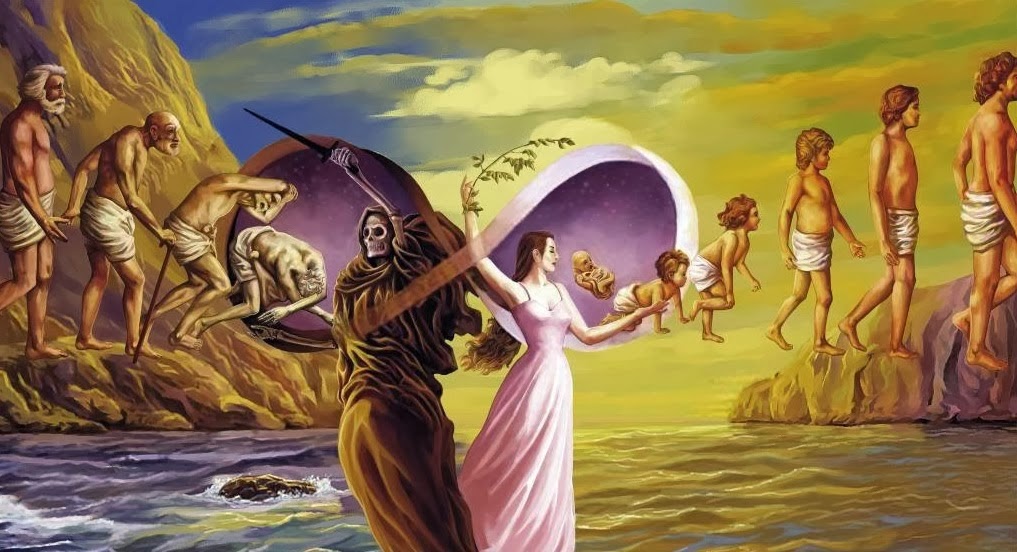
Know that which pervades the entire body is indestructible. No one is able to destroy the imperishable soul.
[Bhagavad-gita 2:17]
For the soul there is never birth nor death. Nor, having once been, does he ever cease to be. He is unborn, eternal, ever-existing, undying and primeval. He is not slain when the body is slain.
[Bhagavad-gita 2:20]
Sometimes we hear people talking about “my soul” or saying that they “have a soul.” They are still thinking that they are separate from the soul, that they are the material body who possesses a soul. But to understand clearly is to know that you are the soul and you are temporarily in the possession of a material body.
People also refer to “soul” in a vague way as the passion or emotional intensity revealed in a work of art or an artistic performance. “It was a very soulful performance” etc. These sorts of references to soul have little to do with the transcendental nature of the soul and are referring more to the mundane mode of passion. Another example of this is “soul music.” So-called soul music usually means “I’m having sex.” And blues music generally means “I’m not getting any sex.”

Spirits and Ghosts
The word “spirit” can have many different meanings depending on the context in which it is used. Spirit can refer to the soul. Because some people refer to the atma as the spirit and others refer to her as soul, we often use the word spirit-soul to make our meaning clear. Capital letters distinguish the Supreme Spirit from the individual spirit-soul:
The embodied spirit, master of the city of his body, does not create activities, nor does he induce people to act, nor does he create the fruits of action. All this is enacted by the modes of material nature. Nor does the Supreme Spirit assume anyone’s sinful or pious activities. Embodied beings, however, are bewildered because of the ignorance which covers their real knowledge.
[Bhagavad-gita 5:14-15]
When we use the word “spiritual,” we are referring to that which is non-material or transcendental to the material world. Spiritual beings, spiritual activities, spiritual world etc. But others use the word spiritual in a lesser sense in order to evoke various sentimental emotions. We hear things like “Redfern Oval is the spiritual home of the South Sydney Rabbitohs” [Rugby League team].

People who communicate with ghosts using mediums and seances call themselves “spiritualists” even though they are in fact acting from the level of the material mode of ignorance. These activities are not transcendental.
The word “spirit,” apart from referring to the spirit-soul, can sometimes refer to ghosts and other beings who have no gross material body but are still covered by the subtle material body. This use of the term spirit comes from common social usage. Srila Bhaktivedanta uses the term in this way in the ninth chapter of Bhagavad-gita:
Those who worship the demigods will take birth among the demigods; those who worship the ancestors go to the ancestors; those who worship ghosts and spirits will take birth among such beings; and those who worship Me will live with Me.
[Bhagavad-gita 9:25]
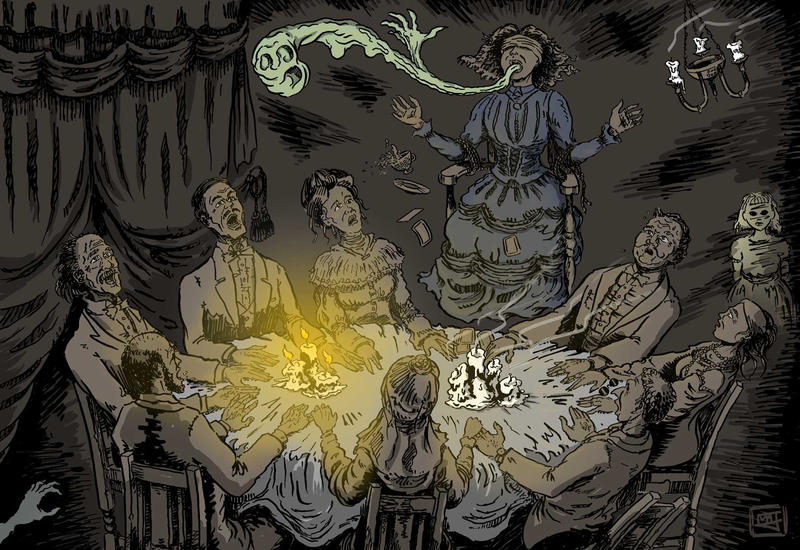
In his purport to this verse, Srila Bhaktivedanta Swami states:
If anyone has any desire to go to the moon, the sun, or any other planet, one can attain the desired destination by following specific Vedic principles recommended for that purpose. These are vividly described in the fruitive activities portion of the Vedas, technically known as darsa-paurnamasi, which recommends a specific worship of demigods situated on different heavenly planets. Similarly, one can attain the pita [ancestor] planets by performing a specific yajna [ritual or sacrifice]. Similarly, one can go to many ghostly planets and become a yaksa, raksa or pisaca [different grades of ghostly demoniac entities].
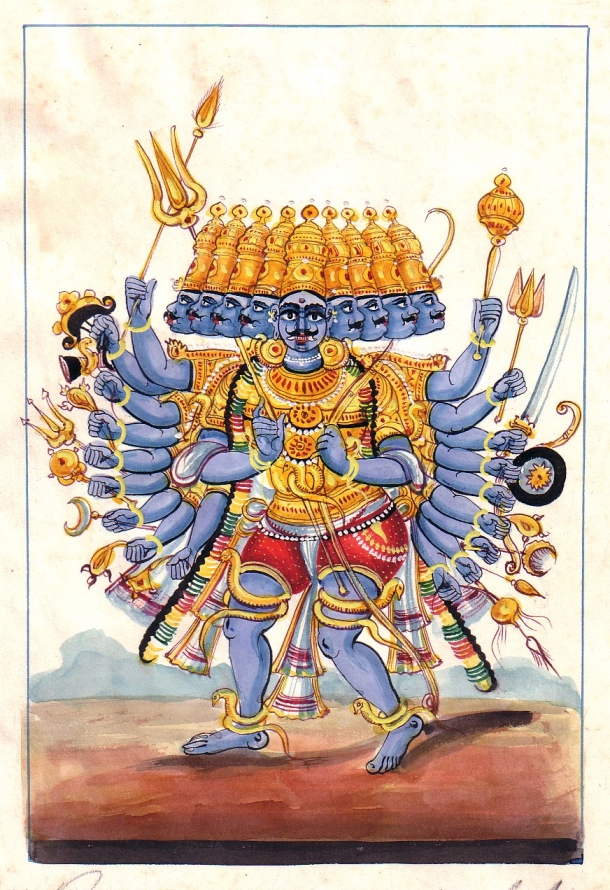
Ravana was perhaps the most famous Rakshasa
Pisaca worship is called “black arts” or “black magic.” There are many men who practice this black art, and they think that it is spiritualism, but such activities are completely materialistic. Similarly, a pure devotee, who worships the Supreme Personality of Godhead only, achieves the planets of Vaikuntha and Krishnaloka without a doubt. It is very easy to understand through this important verse that if by simply worshiping the demigods one can achieve the heavenly planets, or by worshiping the pita achieve the pita planets, or by practicing the black arts achieve the ghostly planets, why can the pure devotee not achieve the planet of Krishna or Vishnu? …
[Purport to Bhagavad-gita 9:25]
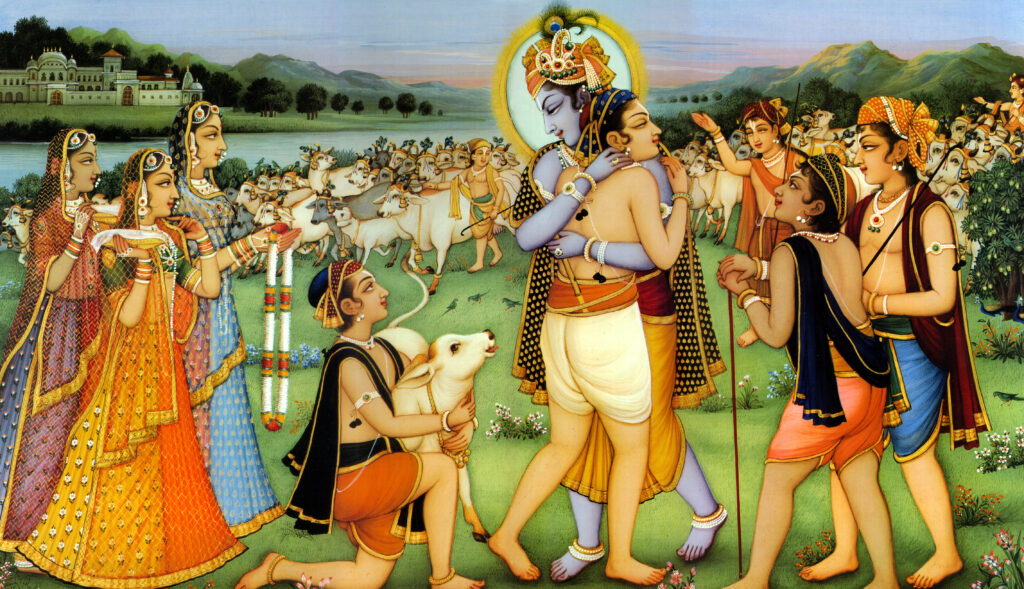
Ghosts and mischievous hobgoblins are also the creation of Brahma; they are not false. All of them are meant for putting the conditioned soul into various miseries. They are understood to be the creation of Brahma under the direction of the Supreme Lord.
[Srimad-Bhagavatam 3:20:40]
In the material world, when one is not covered by the gross body but subtle body, they are called ghosts or pramathas. Those who are good, not harmful, they are called pramathas. … As in this material world there are good men and bad men, similarly, amongst the persons who have no gross body, they are sometimes called ghosts and sometimes they are called pramatha.
[Bhaktivedanta Swami: Vrindavan 1976]
The Holy Ghost or The Holy Spirit
Sometimes the words “ghost” and “spirit” are synonymous. For instance, Christian terms for the Lord in the Heart include Holy Ghost and Holy Spirit. In Renaissance art especially, paintings of the “Holy Trinity” portray the Holy Ghost as a dove. This comes from the New Testament story of Jesus’ baptism, where it is described that The Holy Spirit “descended like a dove.” A white dove is universally accepted as a symbol of peace. The peacefulness and spiritual blissfulness of the Lord’s presence and pleasure descended on the scene – not that the Lord took the form of a dove.
When He had been baptized, Jesus came up immediately from the water; and behold, the heavens were opened to Him, and He saw the Spirit of God descending like a dove and alighting upon Him.
[Matthew 3:16]

… And a voice came from heaven which said, “You are My beloved Son; in You I am well pleased.”
[Luke 3:22]
Angels and Demigods
The demigods are servants of the Supreme Lord in charge of various aspects of universal affairs. As an example, we may have a King who has ultimate control of his kingdom but he is not directly involved in the day-to-day running of the kingdom. Instead, he appoints ministers to be in charge of certain portfolios like roads and hospitals etc. In the same way, the Supreme Lord enjoys pastimes of love with His devotees in the spiritual world while empowering great demigods to manage universal affairs in the material universes. The demigods are all servants of the Supreme Lord. Many are great devotees of the Lord. Lord Brahma and his son Narada Muni are great spiritual masters in our line of disciplic succession, and we respect Lord Shiva as one of the greatest devotees of Lord Krishna – he is always in trance, meditating on Lord Krishna. So, it is not wrong to respect and worship demigods, but only as devotees of the Lord, not as the Supreme Lord. As soon as we put any devotee or demigod on an equal level with the Lord, or call Him Supreme, we commit an offence.
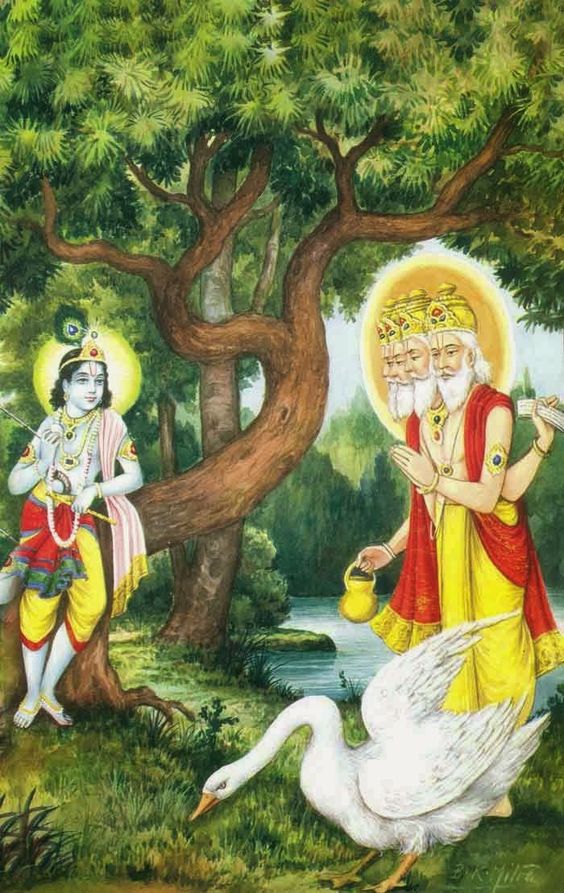
Lord Brahma worships Lord Krishna
As an example, we worship Lord Jesus Christ as a great devotee of the Lord, and this is proper. But many people say that Jesus is God, and thus they ignore his instruction to love God. This is not pleasing to Jesus – no devotee wants to be called God or worshiped as God, but it is proper and wonderful to worship a great devotee as the servant of the Lord. Jesus said,
I have not come to do my will, but the will of the one who sent me.
My Father in heaven is far greater than I.
He did not claim to be or seek to be worshiped as the Supreme Being.
So, many people worship various demigods instead of worshiping Krishna, and this is where the problem arises. Or they say you can worship any God – Shiva, Ganesh, Laxmi or Krishna – it doesn’t matter which one. This is wrong. The Vedas very clearly establish that Krishna is Supreme and all living entities, from the demigods to the tiny insects etc. are His servants in various stages of remembrance or forgetfulness of our relationship with Him. We should respect the demigods as being servants of Krishna, but place our love first and foremost on Krishna Himself. Certain parts of Vedic scripture glorify various “isvaras” [controller gods] and recommend worship of these demigods for various material rewards. Generally, those who are enamoured by the prospect of fulfilling their material desires, will chose to see their chosen demigod as supreme. Krishna says of demigod worship:
Men of small intelligence worship the demigods, and their fruits are limited and temporary. Those who worship the demigods go to the planets of the demigods, but my devotees ultimately reach My supreme planet.
[Bhagavad-gita 7:23]
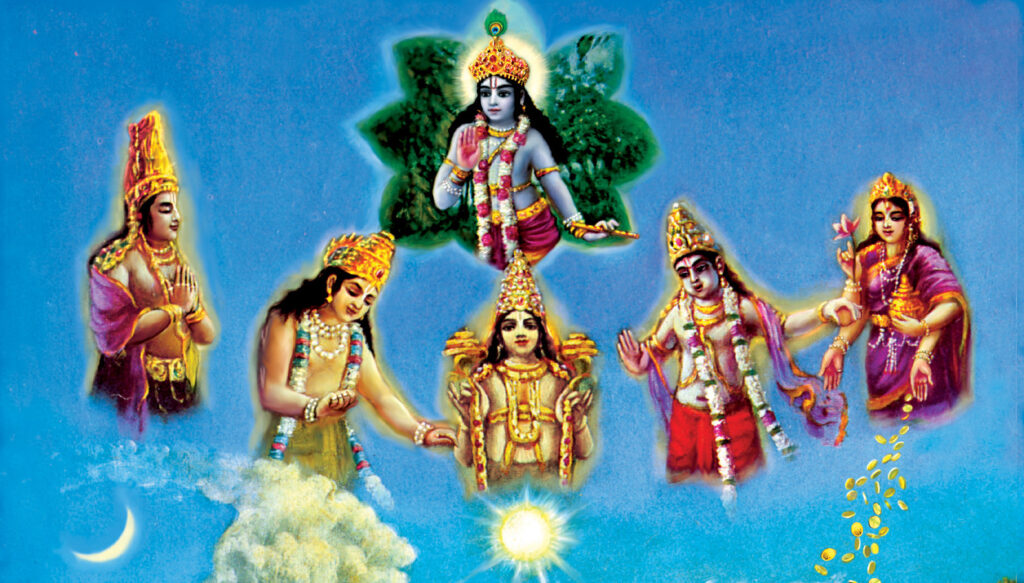
If we love and serve Krishna, all of the demigods and all of the great devotees will be pleased with us. The analogy is given that it is of little value watering the individual leaves of a plant, but if we water the root of the plant then all of the parts of the plant – the roots, stems, branches and leaves – will all benefit. So, Krishna, God, is the root of all existence and if He is worshiped it is natural that we will love all other living beings who are His parts and parcels. But if we focus our attention on the parts and parcels and neglect Krishna, we will suffer and those we place our worship on will also not benefit or be satisfied. No one can be truly happy without loving Krishna, because that is the natural function and condition of all souls.
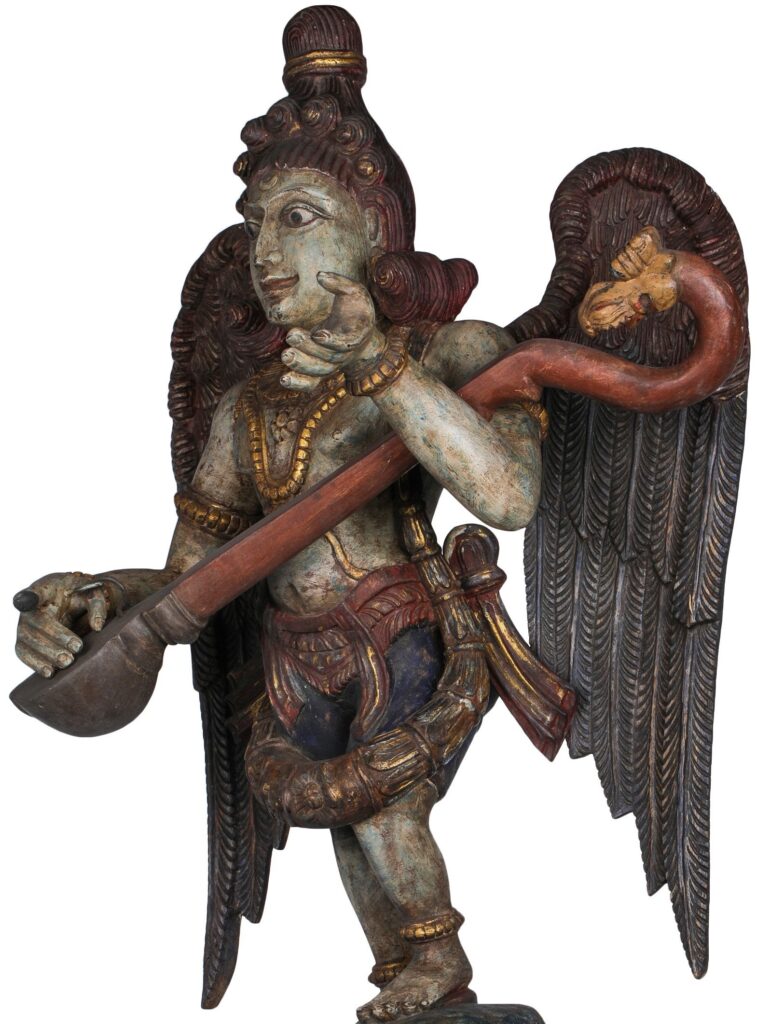
Gandharva
The angels mentioned in the Bible were mainly demigods, higher beings from the heavenly planets within the material universe. But in Christianity, residents of the spiritual world – as opposed to the material heavenly planets – may also be referred to as angels. There are many types of demigods from different planets, who are servants of Krishna looking after universal affairs. Some, known as Gandharvas, have beautiful singing voices and wings, just as the Biblical angels are often depicted. But not all demigods have wings, nor do all angels described in the Bible have wings. There are many mentions of demigods coming to this planet as messengers or to glorify Krishna and His various incarnations and great devotees. They are not always visible to us, but will come to hear great spiritual masters speak. There is a verse in the Bible which mentions angels of fire and wind, which corresponds to some of the well-known demigods:
And again, when God brings His firstborn into the world, He says: “Let all God’s angels worship him … He makes his angels winds, his servants flames of fire (demigods, e.g. Vayu, the demigod who controls wind, and Agni, the demigod who controls fire) … In the beginning, O Lord, you laid the foundations of the earth, and the heavens are the work of your hands. They will perish, but you remain; they will wear out like a garment. You will roll them up like a robe; like a garment they will be changed. But you remain the same, and your years will never end.”
[Hebrews 1:6,7,10-12]
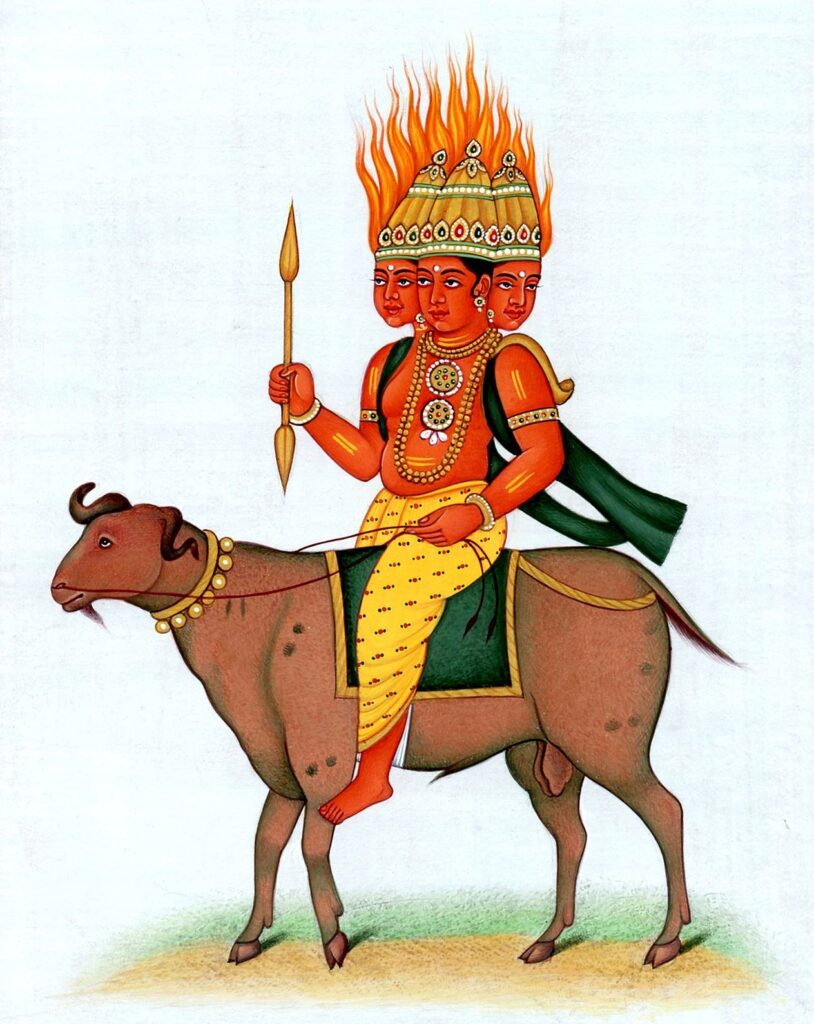
Agni the demigod of fire
This verse also makes it clear that the “heavens” described here are not the spiritual world where Krishna resides but the higher heavenly planets within the material world, as they are described as being temporary – that they will wear out like a garment. The spiritual world, Krishna’s abode, is eternal and unchanging, whereas all planets in the material world are temporary. And the angels or demigods are not residents of the spiritual world, but serve God in the material universes. Their forms, though more subtle and effulgent than ours, are not spiritual or eternal.
There is a lot of nonsense written and believed about angels. A lot of people imagine they have a guardian angel looking after them etc., but angels or demigods cannot save us from death or interfere with our karma. We all have God within our hearts and it is God and His great spiritual masters who can give us shelter from the miseries of the material world. The term “guardian angel” was not used until the late 5th to early 6th century by Pseudo-Dionysius, a philosopher who wrote a set of works known as the Corpus Dionysiacum, falsely using the name of a much earlier Christian scholar.
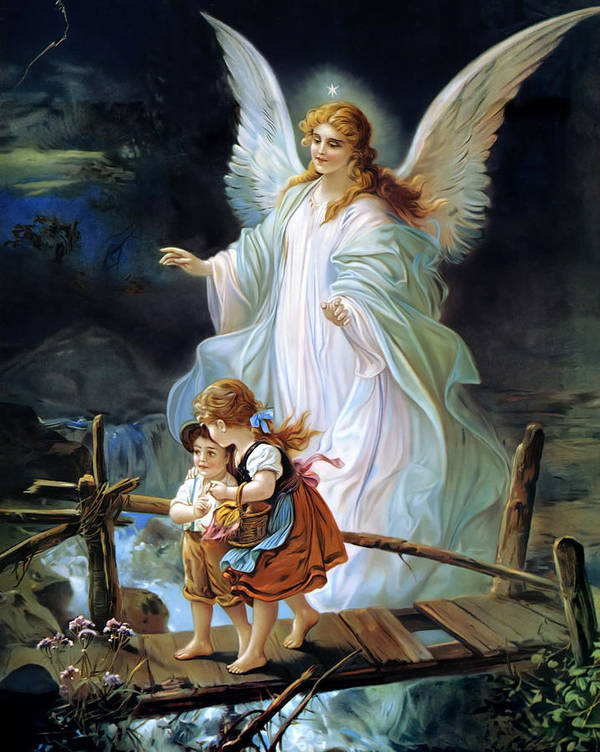
There is no Biblical scriptural evidence to say that we all have a guardian angel, nor is this idea mentioned in the Vedas. If it was a factual idea it would be important enough to be mentioned by Krishna in the Bhagavad-gita. But the Vedic version is that we can all take shelter of the Lord in the Heart – the Supersoul or Holy Spirit. He is our Guardian. And if we are sincere, Krishna will send His devotee – described as being the external manifestation of the Lord in the Heart – to guide and help us. If I can understand and experience that I am being looked after by the Supersoul in my heart, why would I need a guardian angel?
In the New Testament angels are sometimes the intermediaries between God and man. Examples in the New Testament are the angel who assisted Christ in the garden, and the angel who delivered St. Peter from prison. However, nowhere in scripture does it say that everyone has a guardian angel. In one article I read it said:
According to Church tradition we all have an angel with us, who guards us.
The Catholic Encyclopedia states:
That every individual soul has a guardian angel has never been defined by the Church, and is, consequently, not an article of faith; but it is the “mind [opinion] of the Church.” As St. Jerome expressed it: “how great the dignity of the soul, since each one has from his birth an angel commissioned to guard it.”
If we are all being guarded by our guardian angel, why do so many things go pear-shaped in our life? Why do we suffer? Who let the Covid-19 virus out of the bat cave? Never have I heard of a great devotee of the Lord who taught that we all have a guardian angel looking after us. Nor is it written anywhere in scripture. People like to believe that we all have a guardian angel because they do not have enough faith that if we surrender to God, He will protect us. Just prior to his crucifixion, Jesus prayed to his Father, asking Him to protect his disciples, saying that it was his Father’s name that would protect them and enable them to experience yoga or oneness with the Supreme Father. Jesus said:
I will remain in the world no longer, but they are still in the world, and I am coming to You. Holy Father, protect them by the power of Your name – the name You gave me – so that they may be one as we are one. While I was with them, I protected them and kept them safe by that name you gave me.
[John 17:11-12]
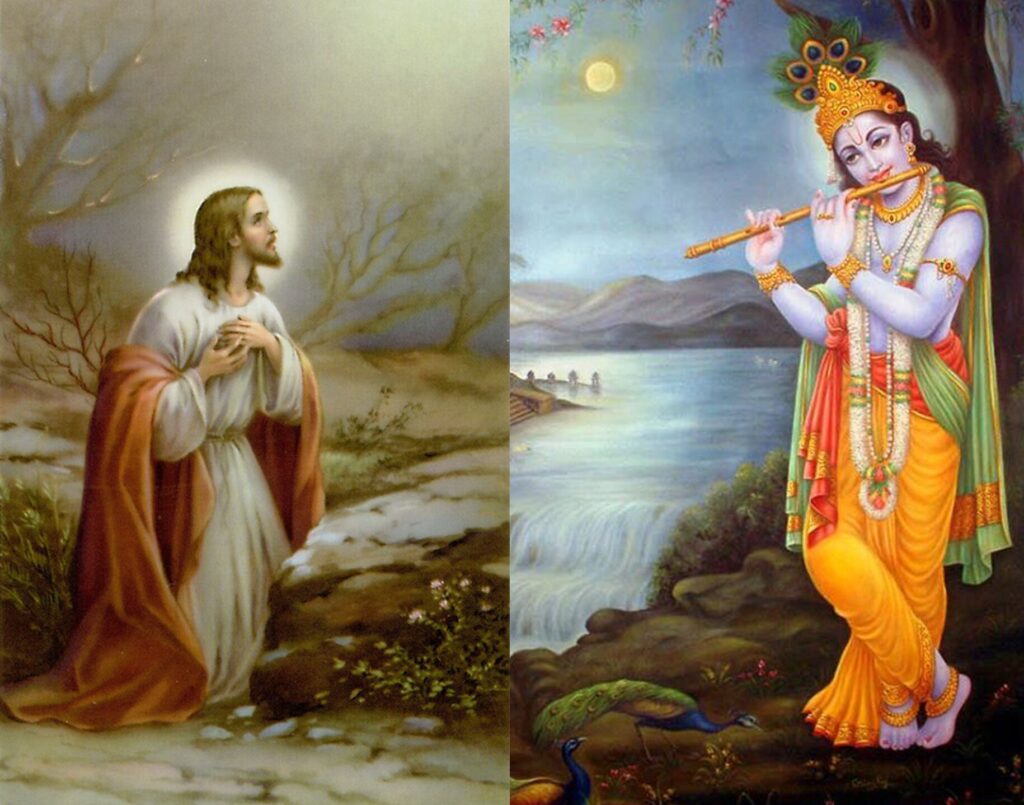
Jesus also said that when he is gone the Holy Ghost or Supersoul will be with them to give them guidance:
And I will ask the Father, and He will give you another Counsellor or Comforter to be with you forever – the Spirit of Truth. The world cannot accept Him, because it neither sees Him nor knows Him. But you know Him, for He lives with you and is in you.
[Lord Jesus to his disciples – John 14:16-17]
If plan B was to give everyone a “guardian angel,” Jesus never mentioned it in what we have of his teachings.
Demons
The Sanskrit word “asura” means an ungodly person or demon. “Sura” means a godly or saintly person. Asuras or demons do not have to look like monsters, but in their hearts, they are envious and inimical to God and his pure devotees. For instance, Duryodhana, the cousin and enemy of the Pandavas who caused the Battle of Kurukshetra, was a demon because he was inimical to Krishna and His devotees, even though he looked like a Vedic prince. Some of the demons in the KRSNA Book are described as being great wizards who could assume any form. It is not that Putana always looked like a witch or Dhenukasura always had the form of a giant donkey:
The great wizards who were able to assume any form were engaged by the King of Bhoja, Kamsa, to kill Krishna, but in the course of His pastimes the Lord killed them as easily as a child breaks dolls.
[Srimad Bhagavatam 3:2:30]
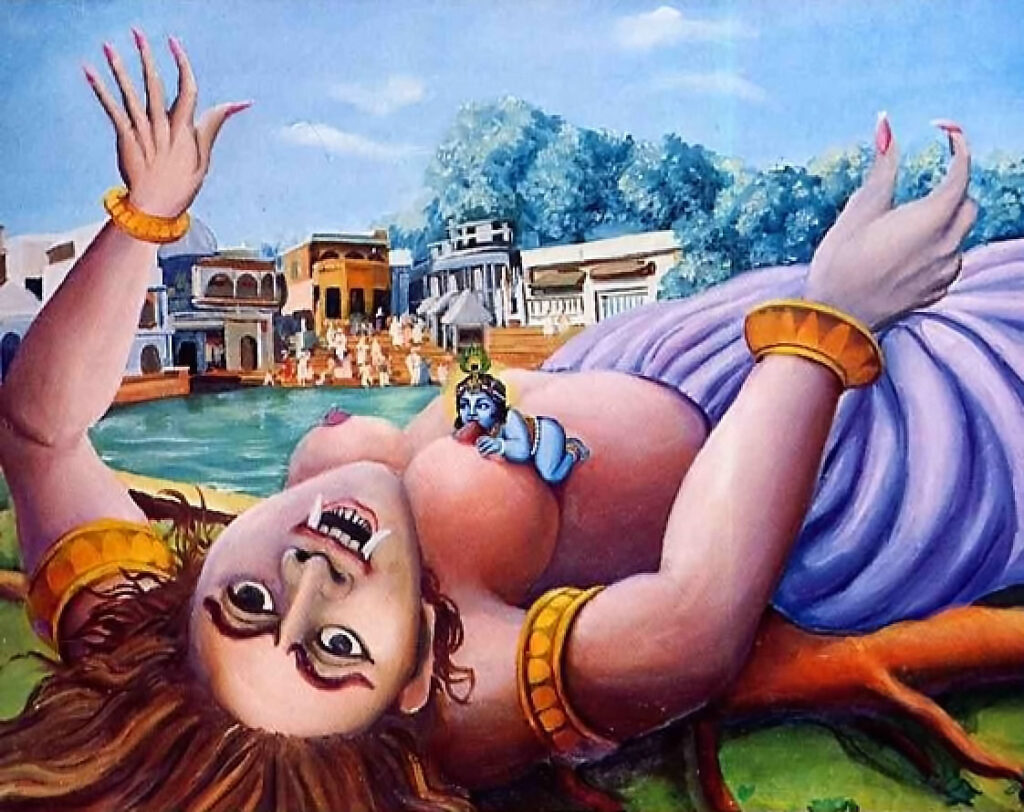
Once upon a time, Putana Raksasi, who could move according to her desire and was wandering in outer space, converted herself by mystic power into a very beautiful woman and thus entered Gokula, the abode of Nanda Maharaja.
[Srimad Bhagavatam 10:6:4]
In the purport to this verse, Srila Bhaktivedanta Swami says:
Raksasis [witches] learn mystic powers by which they can travel in outer space without machines. In some parts of India there are still such mystical witches, who can sit on a stick and use it to fly from one place to another in a very short time …”
[Srimad Bhagavatam 10:6:4 – purport]
Putana came to the palace of Nanda Maharaj and appeared so beautiful and so loving that she was allowed to offer Krishna her breast milk. Krishna was so merciful to Putana that even though she smeared poison on her breast in order to poison Him, after He took her life she was promoted to the spiritual world, where she became one of Krishna’s eternally liberated devotees, loving Him in the mood of maternal affection.
Fallen Angels
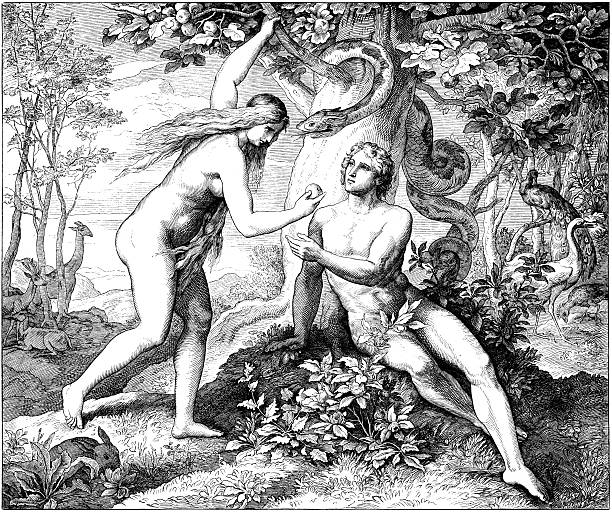
In Genesis in the Old Testament we find the story of Adam and Eve. They were originally servants of God living in Paradise [the spiritual world], but they became tempted by a serpent to enjoy the fruit of the “Tree of Knowledge of Good and Evil,” which they were told would make them like Gods. Being thus displeasing to God, they were expelled from the Garden of Eden, having then to struggle very hard to exist as they were cursed that work would be hard and laborious, while Eve would bear children with great pain. In this story, God told Adam and Eve that they would experience death due to eating from the Tree of the Knowledge of Good and Evil – they lost their eternality. Although this was originally an allegorical story, Paul, and later Augustine, took this story literally, believing that all of mankind have descended from Adam and Eve. Many people still believe that Adam and Eve were our original ancestors:
The influence of Satan … was the cause of the Fall of our first parents, who disobeyed God when they accepted the promise of Satan that “ye shall be as Gods” [Genesis 3:5]. His success in causing Adam and Eve to sin resulted in the first sin committed by man, the Original Sin, which closed Heaven to man until the death and Resurrection of Jesus. It likewise stained all of Eve’s children, a blemish removed only through Baptism. The Catechism of the Catholic Church affirms: “Revelation gives us the certainty of faith that the whole of human history is marked by the original fault freely committed by our first parents.”
[Catechism of the Catholic Church – San Francisco: Ignatius Press 1994. Quoted from “Angels and Devils” – Joan Carroll Cruz p.160]
Interestingly, in 2012 I saw a televised debate between the famous atheist and evolutionary biologist Richard Dawkins and Cardinal Pell, who was head of the Catholic Church in Australia. At one point, Pell was asked if he believed in the existence of an actual Garden of Eden with an Adam and Eve. Cardinal Pell said it was not a matter of science but rather a beautiful mythological account. “It’s a very sophisticated mythology to try to explain the evil and the suffering in the world,” he said. “It’s certainly not a scientific truth. And it’s a religious story told for religious purposes.” At this point Dawkins greatly embarrassed Pell by asking, “In that case, where does original sin come from?” The Catholic Church has taught for nearly 2000 years that the Adam and Eve story was a literally true historical account of man’s origins, and many still hold it to be true. However, Pell, as the leading Catholic in Australia was admitting that though many are now discounting the theory as an allegorical parable or myth, they are still teaching the doctrine of original sin as factual:
In the New Testament, Paul’s view that Adam’s fall introduced sin and death, led Augustine [fifth century A.D.] to develop the doctrine of original sin: that Adam’s fall perverted all humanity and that its effects were passed by hereditary transmission from generation to generation. The belief that Adam, as a corporate personality [existing in a material body], was responsible for the sins of humanity, was never adopted by Judaism, and was resisted by Christian thinkers such as Pelagius and Julian of Eclanum [fifth century A.D.], but Augustine’s interpretation of the Fall became the accepted doctrine of Catholic Christianity.
[The Oxford Companion to the Bible p.223]
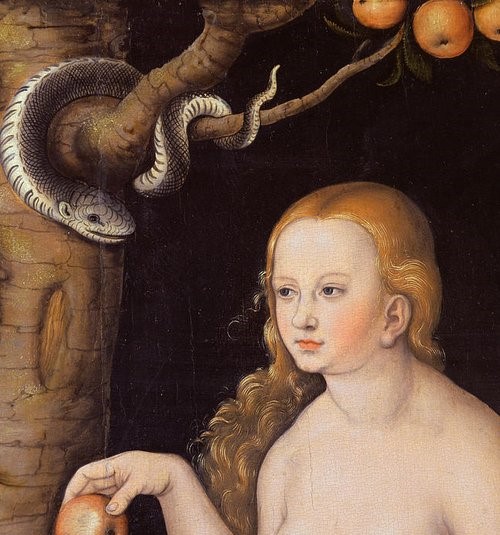
We do not accept this doctrine that we are all born sinful due to the sins of Adam and Eve. This was never the teaching of the Old Testament, and it was never taught by Jesus, who taught, “As you sow, so shall you reap,” not “As Adam sowed, so shall you reap.” This false understanding originated with Paul and was later called “original sin” and incorporated into Catholic theology by Augustine who lived about 400 years after Jesus. The story of Adam and Eve, like the parables told by Jesus, is allegorical. But there is truth in the story – Adam and Eve represent all of us who have fallen from the spiritual world. We are the fallen angels.
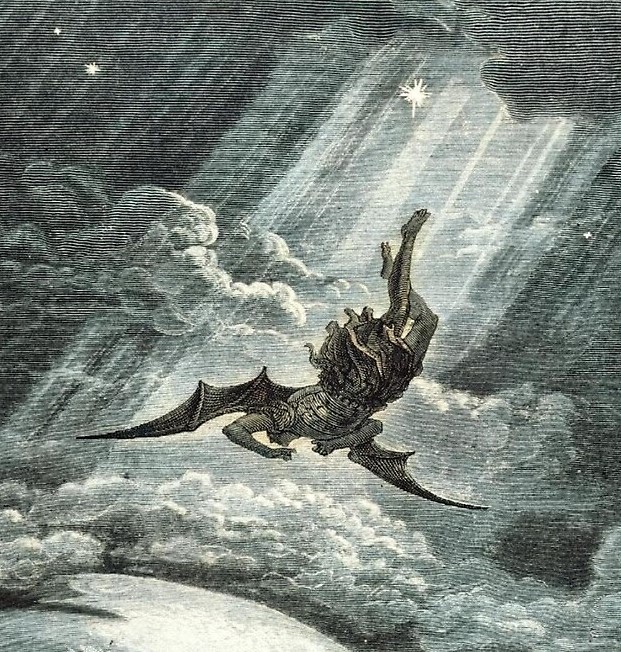
So, what is the actual meaning of this story from Genesis, written about 3,000 years ago by an unknown Jewish author? Adam and Eve represent all of us. Once we were all living in Paradise [the spiritual world] in harmony with God, but due to envy [represented by the serpent] we were tempted to enjoy the fruits of our actions, to be like Gods, supreme enjoyers. Thus envy, which forced us to take birth in the material world, can be seen as our “original sin.” We are not separate from God because of Adam’s rebellion against God, we are here because of our own envy and desire to enjoy separate from Krishna. The “Tree of Knowledge of Good and Evil” is the material body and our attempts to enjoy the fruits of this body, the fruits of our actions, cause us to be bound by good and bad karma – giving us “knowledge of good and evil.”
So, we are all fallen angels – we have fallen from the spiritual world and now we must find our way back by becoming pleasing to Krishna once again. Chant His holy names.
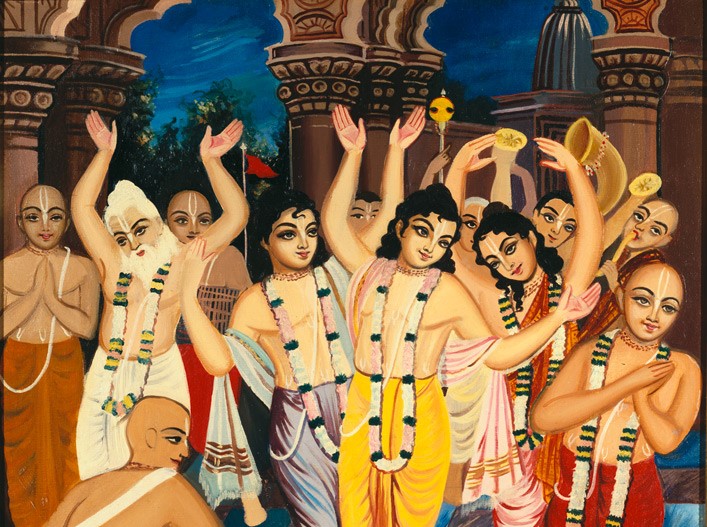

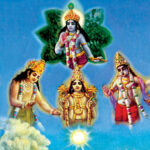
Comment
Thank you for this clear explanation. There is so much wisdom explained in a nutshell on your website, thank you for creating this.